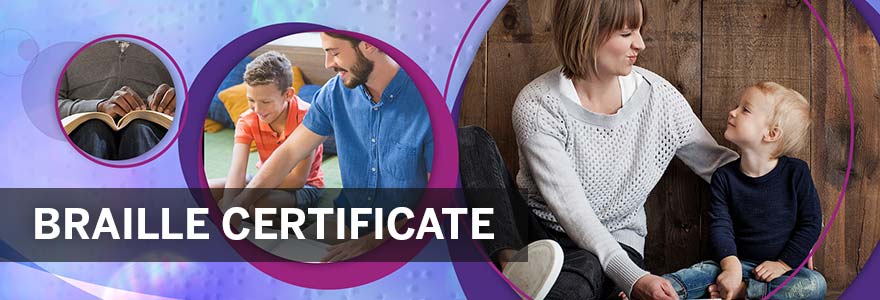
Braille certificate fills an educational gap for those working with visually impaired students

A new certificate program offered through Advanced Studies in Professional Education (ASPIRE), Western’s Continuing Teacher Education program, is filling a need for teachers, educational assistants, parents and individuals working with students who are visually impaired.
ASPIRE at Western’s Faculty of Education is the only provider in Ontario that offers the three-part Additional Qualification (AQ) courses in Teaching Students who are Blind/Low Vision. The new Certificate of Unified English Braille Competence is a supporting component to the AQ courses and was designed and created in partnership with W. Ross Macdonald School in Brantford.
The Certificate of Unified English Braille Competence is a four level certificate, offered online twice per year, usually in the Fall and Winter. This certificate program provides comprehensive and progressive levels of code instruction, expanding the necessary braille skills that will be used to support, teach and communicate with students who are blind/low vision. What makes the program at ASPIRE unique is the practical experience students receive from using a brailler and producing and reading braille.
“That’s the key that separates us from other programs, in that you actually have to read, write and mechanically produce braille material,” said Barbara Thomas, Manager for Advanced Studies in Professional Education.
Laura Thirkill teaches students who are blind/low-vision in the Rainbow School District in Sudbury. She felt the program’s hands-on experience allows teachers to make school curriculum accessible for students who are visually impaired.
“I appreciate that we had to do our braille assignments on an actual brailler because I think that’s more meaningful as I’m using one every day with my students,” said Thirkill. “Like teaching students to read and write with a pencil and with books, we’re teaching students to read and write with a brailler and braille book. It’s a really important skill to be able to ensure these students can access our curriculum.”
There are four levels to the certificate program, the first level teaches the basics – how to work a brailler. As candidates progress from level two to level four, they learn more advanced code. Since a Perkins Brailler costs around $1,200, W. Ross Macdonald School for the Blind has generously offered to lend braillers to the certificate candidates for use with each level.
Special Education Resource Teacher with Halton District School Board, Nazanin Poirier isn’t teaching students who are blind or low-vision but she took the Braille course to prepare for the teaching blind/low vision course that’s offered as an additional qualification. She feels there’s a high need for this type of specialization in Special Education and added the Braille course provides new experiences.
“I never touched a brailler before. I had no idea what I was getting into,” said Poirier. “It reminded me of learning on a traditional keyboard like a typewriter like I did back in the day when I was in grade 7 or 8. Poirier adds, “The reading was a big challenge for me. With uncontracted braille, every letter you have to remember and you have to put those letters together and to create that word and read it out aloud.”
Learning braille is like learning a new language. Candidates must take the time to look at the letters, put them together, sound them out, remember them and then put the words into a sentence. While using a brailler can be intimidating for someone without any experience, Algoma District School Board teacher Jennifer Bouchard felt at ease with the course’s pace, the opportunities to practice and the amount of time she had to complete assignments.
Interested candidates can apply for Level 1 of the program as there are no prerequisites, and each level is the prerequisite for the next. Upon successful completion of all four courses, the candidate will receive a Certificate of Unified English Braille Competence.

